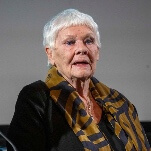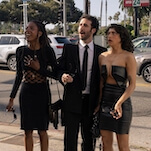I was skeptical of this Women, War & Peace series after last week. The five-part documentary series was obviously writing checks it couldn’t cash with public funds, promising to explore the revolutionary ways in which women are affecting international conflict but settling for high-stakes Lifetime. Not to say “I Came to Testify” is artificial misery porn with an alcohol problem and bad music, just that it’s such a Social Issue story that no amount of global politics can disguise how traditional it is. First of all, it’s narrated by Hollywood Star Matt Damon, and he guides us through the Balkans in the early ‘90s, after someone unplugged the melting pot, when the testimony of a handful of wartime rape victims leads to the passage of new international law framing such assaults as crimes against humanity. Which is something, but it addresses the symptoms of war rather than its causes, and I was promised game-changing, dammit!
Cue Leymah Gbowee, who will no longer stand for this bullshit. In the course of Gini Reticker’s “Pray the Devil Back to Hell,” tonight’s episode, she’s pulled out all the stops—prayer, emotional appeal, stripping naked—whatever it takes to get Liberia to resolve its civil war. In 2002, after three years of government soldiers and insurgents alike terrorizing the countryside, literally raping and pillaging as one searing talking head attests, Gbowee organized a protest movement that would use religion as God intended: to shame its warring adherents into playing nice. A year later, when Gbowee’s organization physically locked both sides in a room, peace was brokered, and Liberia transitioned into electoral democracy. All because Leymah Gbowee demanded to be heard. Now that’s a game-changer.
Obviously it makes a great story, these women taking back their country not through violence but through sheer assembly, and it’s a nice counterpoint to the explosive multiculturalism of “I Came to Testify.” Reticker’s biggest advantage—and that of the whole series—is the modernity of her subject: We have footage of everything. When a security guard threatens to arrest Gbowee for “obstructing justice” with her impenetrable army of pissed off women barricading the negotiation halls and she responds by showing illegal amounts of skin, we have clips! When some of the rebel leaders get ready to kick their way through the women and the former Nigerian president who’s brokering the peace treaty disarms them with, “I dare you,” in not so many words, we have footage of that, too. Women, War & Peace is so well documented it’s like the Wikileaks version of Planet Earth.
But leaving it to contemporary footage and present-day interviews, with nary a factual counterpoint or (God help us) a Morgan Spurlock overview, we’re not getting the newsy education that PBS suggests. This is especially clear toward the end, when Gbowee’s organization campaigns for a female candidate, Ellen Johnson Sirleaf, to win the first election after the transitional government. “Pray the Devil Back to Hell” has plenty of time to weigh in on Gbowee and her readily apparent awesomeness, but it treats Johnson Sirleaf’s presidency, her physical effect on war and peace in Liberia, like a symbol. She’s the first elected female president in all of Africa, which is great as far as it goes, but some of us have been around the block with a symbolically revolutionary Nobel Peace Prize winner is all I’m saying, and the doc doesn’t give us much information on her leadership one way or the other. If anything, it has us wondering why Leymah Gbowee isn’t the woman formally running the country.
It’s a minor concern as long as we acknowledge that we’re streamlining history into an inspiring story, because the narrative of “Pray the Devil Back to Hell” resonates on as many fronts as Claire Denis’ similarly omnivorous take on postcolonial Africa, White Material. First, there’s the aforementioned multiculturalism. What begins as a group of Christian women quickly packs on the local imams via a Muslim woman inspired by Gbowee, Asatu Bah Kenneth, and later the many frustrated husbands of Liberia when our 21st century Lysistrata organizes her sex strike (though, again, we have to take her word for its efficacy—footage not found). With Europe’s spate of protests and riots inspiring so many hand-wringing editorials calling multiculturalism a failure, as if it were some kind of experiment we tried in college and not the natural course of globalization, counterexamples are important. If High School Musical taught us anything, it’s that we’re all in this together.
Of course the obvious lesson is that democracy doesn’t flow from the barrel of a gun, except for when it does, but hear me out. In this narrative, the insurgent group Movement for Democracy in Liberia failed to achieve through violence what a bunch of singing women achieved through nonviolence, not that the former group was actually interested in liberal democracy. As the past year or so has proved, assembly is a powerful force.
Which brings me to the most inspiring element of Leymah Gbowee’s story: Anyone can change the world, unless that sounds too cheesy, in which case I’ll just say all democratic movements start somewhere. In 2001, Leymah Gbowee was a social worker cleaning up after the country’s first civil war, won by President Charles Taylor and his army of drugged up child soldiers. Ten years later, she’s a Nobel Peace Prize winner whose creativity and determination actually ended a war. I just wanted what Women, War & Peace promised. Boy, did Leymah Gbowee deliver.
Stray observations:
- President Charles Taylor has a colorful history. Among the highlights: While in detention in the US awaiting extradition to his homeland for participating in a 1980 coup, the CIA let him break out of jail so he could mount another coup; next, he trained under Colonel Kaddhawffphi in Libya and proceeded to back or lead several insurgencies in west Africa. His American son is the only person prosecuted under a law prohibiting US citizens from torturing people overseas (what legislators call “pulling a Hostel”).
- Favorite moment: The security guard who was about to arrest Leymah Gbowee outside the negotiation hall later helped her fill in some holes in the wall o’ women.
- Ever the political rascals, the Nobel Committee also bestowed the Peace Prize on two other women this year, including headliner Ellen "What do we really know about her" Johnson Sirleaf, up for election just days after the announcement, and Yemen's Tawakel Karman, whom you can look up on your own time.
- Gbowee’s radio ads asked, “Are you sick and tired of war?” Now that’s an infomercial I can believe in.







































